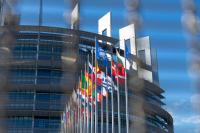
Waving goodbye to what it calls “disflationary dynamics,” the European Central Bank on Wednesday sent clear signals that Eurozone interest rates will continue to rise for the foreseeable future after a first hike that could come as early as July.
Two of the bank’s top policy makers, speaking at different events, both underlined the need for the ECB to leverage monetary policy in order to keep inflation under control. The ECB said that monetary policy actions have become “more urgent” now that inflation will be “painfully high” for some time, while upward pressure on prices is “persistent” even under different scenarios.
Financial markets already have priced in expectations of a first ECB rate hike in the summer but so far have been in limbo about the strength of further monetary policy actions in the eurozone. Comments made on Wednesday made clear that further rate hikes are to be expected.
July now being factored in
Speaking in Slovenia, ECB president Christine Lagarde said this hike should be expected within “only a few weeks” after the central bank halts its asset purchase programme, pointing towards July as a moment to initiate rate hikes, which would then be followed by further rate increases.
“It looks increasingly unlikely that the disinflationary dynamics of the past decade will return,” Lagarde said in her speech. “As a result, it is appropriate for policy to return to more normal settings… After the first rate hike, the normalisation process will be gradual.”
Meanwhile in Vienna, ECB board member Isabelle Schnabel, said that Europe can not ignore a global context in which strong demand for oil, commodities and consumer products, as well as labour market conditions, are also responsible for driving inflation.
“It rather means that the importance of keeping inflation expectations firmly anchored at our target has increased,” said Schnabel. “Large and persistent global shocks can destabilise inflation expectations even if the main source of expansion or contraction stems from abroad.”
‘Persistent underlying price pressures’
Schnabel laid out two ECB scenarios in which underlying price pressures will be seen as persistent. In the first scenario, underlying price pressures can be expected to persist for as long as global supply and demand imbalances do not improve visibly.
In the second scenario, higher profits give rise to higher wages, reflecting a tight labour market at a time when firms are still adding jobs at a considerable pace, which can be seen as “a good predictor of strong future wage growth,” Schnabel said.
In both scenarios, underlying price pressures are likely to remain elevated. This means that” inflation could stay at painfully high levels for a considerable period of time, with a risk that it might fall back towards our target of 2% at a slower pace than previously envisaged,” she said.
Bunds-BTP spread widening
Further rate hikes in Europe are expected to fuel uncertainty also over government finances and will likely test coherence among countries in the Eurozone.
“Europe is not the US in the sense that when interest rates rise in the US, most global investors will resort to buy treasuries,” said Vincent Juvyns, global market strategist at JP Morgan Asset Management. “In Europe when interest rates rise, global investors don’t necessarily massively increase their exposure to European debt.”
In recent weeks, for example, the spread between 10-year bunds and 10-year Italian government governments, known as the Bund-BTP spread, has widened significantly towards 200 basis points from 160 basis points a month ago, reflection concern over the Italian government’s capacity to pay off its debt and manage its budget. Rising rates make it harder for countries that still face significant debt loads to deal with these. Italy’s budget deficit also is expected to be strained further if EU governments agreed to stop oil and gas imports from Russia.
1% rise equals France’s defence budget
In France, French central bank governor François Villeroy de Galhau, speaking to Le Figaro newspaper on Wednesday, said that every 1 percent increase in eurozone rates costs French taxpayers approximately 40 billion euro per year. That is equivalent to the country’s defence budget for 2021. Further rates hikes thus can also cast shadows over important political decisions in EU member states in the coming years.
Juvyns said he remains confident about Europe’s economy, holding on to growth forecasts of about 2 percent for this year and next. Unlike the Covid crisis, the current economic and geopolitical conditions are not expected to bring the economy to a full stop.
The next ECB monetary policy meeting is scheduled for 9 June in Amsterdam. This will be followed by a Frankfurt meeting on 21 July.
Related articles on Investment Officer Luxembourg:














